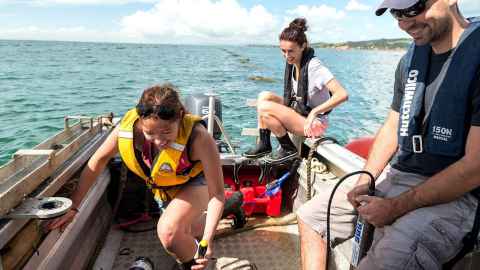Bigger waves needed to turn the tide on plastics
15 March 2018
Opinion: There is such a wide scope for reducing our plastic footprint, so where is it? asks the University of Auckland's Emily Joy Frost.

New Zealand is turning the tide on plastic pollution. That was the message given on Monday by Associate Minister Eugenie Sage when she committed the country to the United Nations CleanSeas campaign at the Volvo Ocean Race Village in Auckland.
By signing up to CleanSeas, the Government is pledging to make significant reductions to the production and use of non-recyclable plastics, and single use items like plastic bags, by 2022. We are the 42nd country to make this pledge since the campaign began a year ago.
The decision to sign up to this commitment with the United Nations is the latest step in a series of measures that the Government already has in place to try and achieve its goal to significantly reduce waste going to landfill by 2020. These measures include the well-publicised ban on microbeads; support for marine debris data gathering; funding of initiatives through the Waste Minimisation Fund; review of implementation of the Waste Minimisation Act and development of options on controlling single use plastic bags.
While these are all good steps in the right direction, are they really enough? Compared to a fair number of countries, including some of our Pacific neighbours, New Zealand is on the back foot when it comes to reducing our plastic footprint. Recently, Vanuatu passed legislation, which came into effect on February 1, which bans the use, manufacture and importation of single use plastic bags and polystyrene takeaway food containers. They will be joining other island nations such as American Samoa, the Marshall Islands and the Micronesian state of Yap. In addition, several Australian states have begun to put bans on single use plastic in place.
When will there be a solid action plan to address the plastic issue around our coasts?
Adding to our below average performance so far, at the United Nations Ocean Conference in June last year, New Zealand made only two commitments to addressing local pollution. One was the already-passed legislation on microbeads, the other was the Fonterra and Department of Conservation partnership formed to help manage farm run-off. But there is such a wide scope for additional, more hard-hitting change so where is it?
The devastating impact single-use plastic has across the world, including here, has been well-publicised in the media over the past year. Researchers across the globe, including University of Auckland PhD candidate Ana Markic, have been looking at the impacts of plastics in marine fish species. They have seen the effects of plastics passing through the digestive system and into the flesh of commonly-eaten fish species and found evidence that microplastics have reached the most remote and pristine waters in the world. Some of the water samples reviewed by scientists were collected in the Volvo Ocean Race.
All this research is pointing to the fact that not only will this plastic pollution have a potential effect on individual marine species; it has potential for a catastrophic effect on entire ecosystems.
It is time the Government took notice of the wonderful work of New Zealanders who are trying to highlight the impact plastic is having in our marine environment. This includes the passion-driven work of groups such as Eco Maori, Greenpeace and dedicated individuals who several weeks ago brought the 'Ban the Bag’ petition to the steps of Parliament. In addition, the amazing efforts of Ngahiraka Mai Tawhiti leading local children in a microplastic sampling and clean-up session in the Chatham Islands.
A knock-on effect of signing the pledge is that New Zealanders can call the Government to action on plastic waste and ask some hard questions like when will the Government hear this call and implement a levy or a ban on single-use plastic? When will there be a solid action plan to address the plastic issue around our coasts? And when, in this storm of global ocean change and pollution, will New Zealand really start pushing to turn the tide on plastics and start to implement change for our precious taonga?
Emily Joy Frost is a doctoral candidate in the University of Auckland’s School of Biological Sciences.
This article reflects the opinion of the author and not the views of the University of Auckland.
Used with permission from Newsroom, Bigger waves needed to turn the tide on plastics published on 15 March 2018.